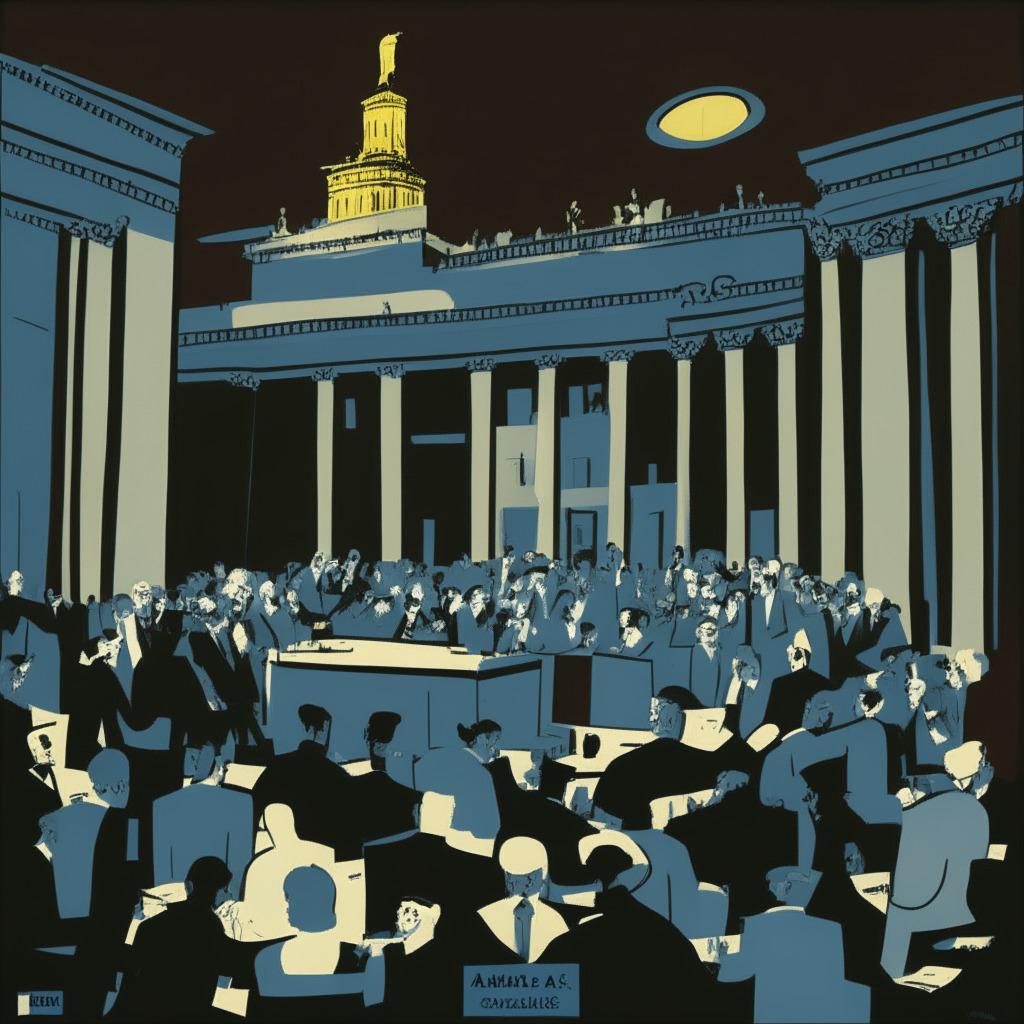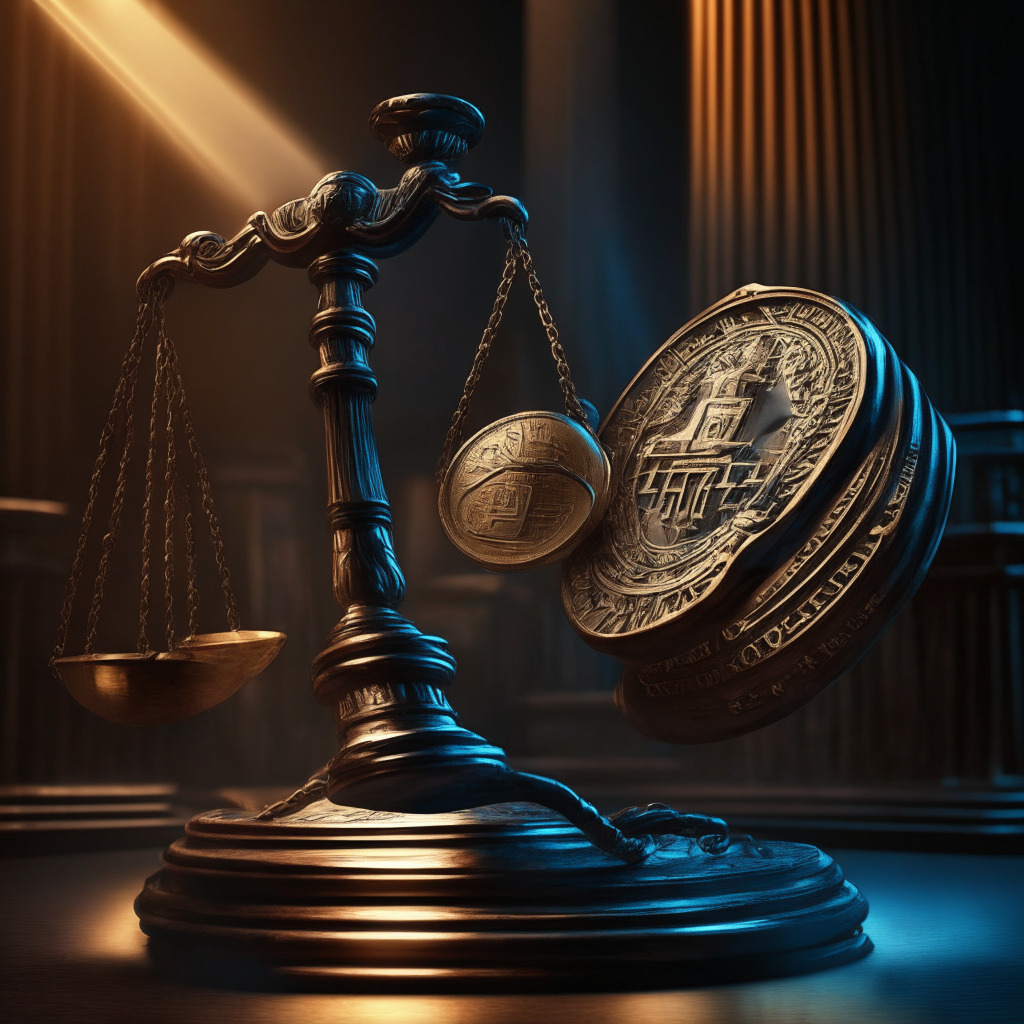In a recent House Energy and Commerce Committee Subcommittee meeting, Polygon Labs’ Ryan Wyatt discussed the potential of blockchain technology in creating a decentralized, transparent Web3, benefiting users and driving economic growth. He emphasized the need for a well-regulated blockchain ecosystem in the US to maintain competitiveness and ensure domestic technology industry thrives.
Search Results for: United States Congress
Crypto Titans and Regulators to Debate New Bill in Congress: Impact on US Innovation
Coinbase, Robinhood, and US commodities regulator representatives will testify before Congress on June 6 regarding a proposed crypto bill. The bill aims to classify certain crypto tokens as digital commodities and provide a clearer regulatory framework. Coinbase Chief Legal Officer Paul Grewal emphasized its importance for protecting consumers and fostering crypto innovation in the US.
AI Regulation Debate: Halt in Development or Prioritize Ethics? Congress to Decide
A congressional hearing on AI oversight featuring prominent figures like OpenAI CEO Sam Altman, IBM’s Christina Montgomery, and NYU’s Gary Marcus will discuss potential regulations and address safety and privacy concerns. As AI regulation debates continue, the impact on industries like fintech, cryptocurrency, and ethical AI development remains uncertain.
Bipartisan Act Targets Crypto: Regulating Congress Investments or Unnecessary Intrusion?
The Bipartisan Restoring Faith in Government Act aims to ban members of Congress, their spouses, and dependents from trading or owning specific financial instruments, potentially including cryptocurrencies. This legislation raises questions about the future of cryptocurrency regulations and government officials’ involvement in the emerging market.
Congressmen Challenge CEA’s Crypto Stance: Innovation vs Consumer Protection Debate
U.S. Congressmen Warren Davidson and Mike Flood express concerns over the Council of Economic Advisers’ negative stance on digital assets, arguing it may displace innovation and economic growth. They advocate for a regulatory framework supporting innovation while maintaining essential protections and question the dismissal of digital asset benefits in the recent Economic Report of the President.
Title: Crypto Clash in Congress: U.S. House Committees to Embark on Unprecedented Joint Hearings for Digital Assets Regulation
The U.S. House of Representatives is taking major strides towards addressing digital asset regulations as […]
Balancing Acts: mBridge’s CBDC Project, Opportunities and Geopolitical Concerns
The mBridge Central Bank Digital Currency (CBDC) project, comprising members from China, Hong Kong, Thailand, UAE, and BISIH, is preparing for expansion. The project offers faster, cost-effective, and transparent cross-border transactions. Concerns rise from potential exploitation for sanctions evasion.
Crypto Chaos: Guilty Plea Unsettles Ex-FTX CEO’s Trial, Who’s Affected and the Ensuing Regulatory Riddle
“Ryan Dalame, ex co-CEO of FTX Digital Market, may plead guilty in a campaign finance violation case involving $24 million from FTX users. This development may impact the trial of Sam Bankman-Fried, FTX’s former CEO, and has generated tension in the cryptocurrency world, emphasizing the need for robust regulatory frameworks for blockchain’s future.”
The SEC’s Crypto Crackdown: Necessary Oversight or Innovation Barrier?
“Bittrex agreed to a $24 million settlement following SEC allegations of operating as an unregistered securities exchange, part of an acceleration of SEC’s enforcement on disruptive crypto firms. The aggressive regulation is critiqued for thwarting investment and innovation, pushing the industry to more amiable jurisdictions like UAE or UK.”
FTX Exchange Recovers $7B in Assets: Exploring Blockchain’s Challenges in Asset Tracing & Transparency
FTX exchange recovered approximately $7 billion in liquid assets, amidst challenges faced due to the extensive commingling of funds resulting from the misappropriation of customer assets. The misrepresentation of funds raises concerns about transparency and trust in the cryptocurrency industry, highlighting the importance of accountability.
US Debt Ceiling Deal: Impact on Shiba Inu’s Journey to $1
Shiba Inu has experienced a 3% increase within 24 hours, potentially influenced by the US debt ceiling deal that averted a default on financial obligations and preserved the economy’s stability. However, various factors impact the cryptocurrency market, and Shiba Inu’s future value should be monitored alongside other indicators and developments.
Shiba Inu’s Path to $1: Can the US Debt Ceiling Deal Propel SHIB’s Growth?
Shiba Inu’s market trajectory could be influenced by the potential US debt ceiling deal. The recent 3% gain has caused speculation about whether it could drive SHIB’s price towards the $1 mark. The four-hour timeframe reveals bullish sentiments, but sustained candle closures above resistance are necessary for confirmation.
Democratizing AI Governance: OpenAI’s $1M Grant Initiative for Ethical System Rules
OpenAI will award ten $100,000 grants for experiments in establishing a democratic process for AI system rules, aiming for responsible oversight of AGI and superintelligence. This initiative raises essential questions around AI governance and transparency, with results freely accessible to the public to promote ethical AI conduct and a responsible future for artificial intelligence.
U.S. Crypto Regulation: Balancing Innovation and Public Safety to Ensure Global Leadership
The U.S. Chamber of Digital Commerce is urging Congress to prioritize a national approach to crypto regulation, warning that the lack of proper legal frameworks may result in the nation falling behind in the rapidly evolving blockchain space. Implementation of a unified strategy could bolster U.S. leadership, promote innovation, and address potential risks.
Navigating the Crypto Landslide: SEC Scrutiny, DeFi, and the Quest for Regulatory Balance
David Hirsch from the SEC’s Crypto Assets and Cyber Unit warns of an impending increase in charges against crypto exchanges and DeFi projects suspected of securities law violations. Expert Brandon Zemp advises caution and strategic action, noting regulatory pressures can influence DeFi evolution but also foster a healthier market and developer ecosystem.
Shadows Over Crypto: Fentanyl Sanctions, Regulatory Barriers, and the Future of Bitcoin
Bitcoin saw a slight downturn recently amid challenges such as the US Treasury’s move to outlaw cryptocurrency wallets and a crackdown on illicit substances like fentanyl. Additional regulatory barriers in the US are hindering crypto innovation, leading to concerns over future Bitcoin prices and investor sentiment.
Ripple’s Rise in Singapore vs. Coinbase’s Legal Quagmire: Paving the Path for Crypto Regulation
The Monetary Authority of Singapore has awarded Ripple a digital payment tokens license, enhancing its position in the digital asset market. Concurrently, the SEC and Coinbase are engaged in a contentious lawsuit, calling attention to potential hurdles and the urgent need for clear cryptocurrency regulation.
Government Shutdown Dodged: Possible Fallout for Cryptocurrency Regulation
“The future of cryptocurrency regulation was at risk with the potential for a government shutdown. This stalemate could have hindered several key crypto-focused bills, including the Financial Innovation and Technology for the 21st Century Act, the Blockchain Regulatory Certainty Act, among others, shaping crypto’s future.”
Unraveling the Crypto Carousel: SEC vs Binance, and the Circle Defence
The blog post discusses the legal fight between the SEC and cryptocurrency exchange Binance over the classification of digital assets as securities. It also touches on Circle’s argument that stablecoins linked to the U.S. dollar, such as BUSD and USDC, shouldn’t be categorised as securities. The outcome of the legal battle could greatly impact the future of cryptocurrency regulations.
SEC’s Bitcoin ETF Decision Delay: A Strategic Extender or Investor Protector?
The U.S. Securities and Exchange Commission (SEC) has postponed ruling on applications for spot Bitcoin exchange-traded funds (ETFs), including from big players like BlackRock and Invesco. This delay coincides with the possible U.S. government shutdown and its impact on SEC’s operations. Despite pointed SEC caution due to investor protection concerns, industry optimism for a Bitcoin ETF approval is rising.
Gary Gensler’s Regulatory Tightrope: Balancing Innovation and Regulation in Cryptocurrency
The SEC under Gary Gensler’s leadership has been accused of regulatory overreach, hampering the U.S. capital markets. While many criticize the lack of clear regulations around cryptocurrencies and other novel financial instruments, Gensler refrains from concrete classification, highlighting the complexity of these emerging issues.
The Lure and Perils of Imminent Ethereum Futures ETFs Launch Amid U.S. Shutdown Fears
Bloomberg analysts predict the launch of Ethereum futures exchange-traded funds (ETFs) in the US, possibly accelerated by a potential government shutdown. The SEC might permit various Ethereum futures ETFs to launch next week. Despite previous failed attempts, analysts give a 90% chance of launching this October, but regulatory complexities and uncertainties remain a concern in the crypto market.
Crypto Regulatory Suspense: SEC’s Stance, Stakeholder Worries, and an Uncertain Future
“The U.S. House Financial Services Committee may subpoena the SEC over undisclosed documents related to FTX’s former CEO. The Committee claims the SEC’s lack of cooperation is compromising transparency and hindering digital asset ecosystem growth. This case demonstrates how regulatory bodies are scrutinizing the digital asset industry.”
Pros and Cons of the SEC’s Extended Review Period on ARK 21Shares’ Bitcoin ETF Proposal
The Securities and Exchange Commission (SEC) has delayed its decision on a BTC ETF from ARK 21Shares till January. This delay raises questions about when crypto ETF approvals will arrive in the US. Despite increasing interests, no spot BTC ETF has been approved yet. Members of Congress urged the SEC to approve Bitcoin ETFs, arguing against discrimination on spot bitcoin traded products. The crypto community eagerly awaits the SEC’s final decision, marking January 10, 2023, in their calendars.
Crypto Progress: Are Pending US Bills at Risk Due to a Government Shutdown?
“The imminent US government shutdown threatens several crypto-focused bills awaiting a House vote, casting uncertainty over their fate. The longer the shutdown persists, the more delayed will be crucial crypto reforms. In this scenario, potentially causing regulatory stagnation in crypto markets.”
Global Crypto Regulatory Trends: A Challenge or an Opportunity?
Recent global legislative actions are intensifying cryptocurrency regulation discussions. Hong Kong is focusing on regulated exchanges to decrease fraud-related investor losses, Thailand is taxing overseas crypto profits, Brazil is advocating for digital assets protection, and the U.K. and U.S. are developing bills targeting illegal crypto use and curtailing Central Bank Digital Currencies respectively. Regulatory changes highlight the balance between encouraging financial innovation and protecting citizens.
US Crypto Regulation: An Uneven Playing Field or Necessary Oversight?
The Securities and Exchange Commission’s (SEC) regulation of cryptocurrency firms like Binance, Coinbase, and Ripple, is creating dynamic shifts in the crypto world. Some firms are facing a ‘regulation by enforcement’ approach, while others like Prometheum, have found compliance success, sparking investigations and controversy over potential ‘sweetheart deals.’
Unraveling the Binance vs SEC Saga: A Landmark Battle in Crypto Regulation
Binance, Binance.US, and Changpeng Zhao are legally challenging the U.S. Securities and Exchange Commission, arguing it overstepped its bounds. The crux of the conflict lies in the question of whether the SEC has the right to retroactively regulate the emerging crypto markets. Binance contends that the SEC should have established clear crypto sector guidelines before taking legal action. They also challenge the SEC’s attempt to hold them accountable for crypto asset sales dating back to July 2017, during a time of unclear regulatory norms for crypto.
How US Regulations Can Spur Transparency In The Cryptocurrency Industry
“Senator Sherrod Brown has expressed concern about the cryptocurrency industry’s lack of self-regulation and transparency, predominantly benefiting insiders and executives. He urged key U.S. financial policy-makers to increase transparency and balance fostering innovation with protecting consumers in the crypto industry.”
Blockchain’s Potential Role in AI Authentication and Its Legal Challenges in the US
“U.S. Rep. Tom Emmer suggests that blockchain technology could play a key role in authenticating AI-generated data, marking a significant intersection for blockchain and AI. Additionally, he signals potential policy distractions on digital assets, urging for innovative strides rather than legal controversies in cryptocurrency policies.”
Shifting Tides in the Crypto Market: From Mining Crises to Advancements in Blockchain Technology
“Bitcoin trading volumes have dipped below the $5 billion mark due to an ongoing power crisis in Texas impacting cryptocurrency miners. However, increasing signals from influential parties indicate growing acceptance of digital currencies like blockchain-based tokens from JPMorgan aimed at revolutionizing fund transfers.”
Navigating the Regulatory Conundrum: A Balanced Approach for DeFi Advancement
Commissioner Summer K. Mersinger raises concerns over CFTC’s focus on enforcement actions rather than engaging with the public and stakeholders when dealing with DeFi technologies. She suggests collaborative rulemaking, regulatory instruments and public engagement can be more effective in managing DeFi’s innovative scope and ensuring market participant safety.































